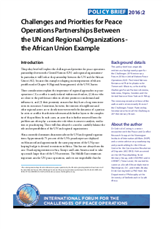POLICY BRIEF 2016:2 Challenges and Priorities for Peace Operations Partnerships Between the UN and Regional Organizations – the African Union Example

This policy brief explores the challenges and priorities for peace operations partnerships between the United Nations (UN) and regional organizations. In particular, the paper looks at the partnership between the UN and the African Union, as this example is seen to shape our interpretation of what is possible under Chapter 8 (Regional Arrangements) of the UN Charter.
Three considerations are highlighted as explanations for the importance of regional approaches to peace operations: (1) a conflict is rarely isolated within state borders, (2) those who are closer to the problem are often in a better position to understand and influence it, and (3) their proximity ensures that they have a long-term interest in its outcomes. Sometimes, however, the interests of neighbours and other regional actors are so closely interwoven with the dynamics of a particular crisis or conflict that their involvement adds further layers to the complexity of the problem. In such cases, an actor that is further removed from the problem can often play a constructive role when it comes to analysis, mediation or peacekeeping. The policy brief thus notes that there will always be a need to carefully balance the roles and responsibilities of the UN and regional organizations.
The author of this paper, Dr Cedric de Coning is a senior researcher with the Peace and Conflict Research Group at the Norwegian Institute of International Affairs (NUPI) and a senior advisor on peacekeeping and peacebuilding for the African Centre for the Constructive Resolution of Disputes (ACCORD). He has served on the UN Peacebuilding Fund Advisory Group, with UN DPKO and in UNTAET (Timor Leste). He started his career as a South African diplomat in Washington, D.C., and Addis Ababa. Dr de Coning holds a PhD from the Department of Philosophy at the University of Stellenbosch in South Africa.

